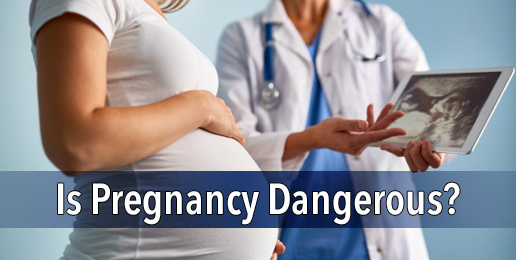
In 2006, a woman named Rozelletta Blackshire was arrested in Georgia and charged with criminal abortion and first degree cruelty to children.

Why? According to police, she and her two cousins had forced her 16-year-old pregnant daughter to drink turpentine in order to force an abortion.
Pregnancy should not be a threat to women.
But too many women in today’s world are finding that it is. The abortion lobby incessantly claims to stand for women’s choice, but does not sufficiently address the fact that what a woman appears to choose can in reality be a response to underlying pressures, coercion, and even violence from those around her.
So, in order to understand the dangers that many pregnant women face, let’s look at a study that examined the most severe case of violence possible: death.
The Journal of the American Medical Association—currently one of the most prestigious journals in medicine—published a study in 2001 that examined common causes of death among pregnant women in Maryland between the years 1993 and 1998.
Can you guess what was the #1 cause of death among these pregnant women? Let’s run through a few options.
Medical issues, perhaps? Certain pregnancies can be quite rocky, after all—and every pregnancy puts at least slight risk on the mother’s health. But no, medical issues were not the #1 cause of death for these pregnant women.
What about infections or accidents—external threats to a pregnant woman’s health that could arise while she was carrying the baby? No, infections or accidents were not #1 either.
What about self-inflicted harm, such as substance abuse or suicide? While these were sadly on the list, they were at the very bottom.
So what was the #1 cause of death among the group of pregnant women studied? Brace yourself for it: Homicide. In the authors’ own words,
“Homicide, the leading cause of pregnancy-associated death, was responsible for 20.2% of all pregnancy-associated deaths” (p. 1,457).
Closely edging out cardiovascular disorders, but far outstripping other conditions such as embolism, hemorrhage, or hypertensive pregnancy disorders, the most common reason why pregnant women died was that another human killed her.
“Well, that might not prove much if we don’t know what the homicide rate was for non-pregnant women,” you might say. It so happens that the authors knew:
“By comparison, homicide was the fifth leading cause of death among Maryland women aged 14 to 44 years who had not had a pregnancy in the year preceding death and was responsible for 457 (6.4%) of total deaths among this group” (p. 1,457).
In other words, homicide was the cause of three times more deaths among women who died while pregnant than among women who died while not pregnant.
But what if we break it down by race or age? The authors do admit that the pregnant women studied were more likely to be African-American and young, both of which are factors that are already associated with higher rates of homicide regardless of pregnancy. But the authors adjusted for that and found the same conclusion anyway.
“While adjustment for race and maternal age increased the proportion of deaths due to homicide to 11.2% among women who had not been pregnant in the year preceding death, the adjusted figure was still significantly lower than the figure of 20.2% among women who had been pregnant” (p. 1,457).
Wow.
I was surprised when I first discovered this study, and it still is hard to fathom even now. In the sample these authors studied, the most deadly threat pregnant women faced was not the medical or mental complications of the pregnancy.
It was other people.
The problems we see here are just a portion of a larger national and international issue, of course. A study published in 2012 found that estimates of perinatal intimate partner violence (domestic violence from a woman’s boyfriend in the months whether before or after giving birth) were reported between 3% and 17% in the United States (Peace Psychology Perspectives on Abortion, p.11).
While some of this violence could have occurred after childbirth—or could even have been the cause of pregnancy to begin with—in all probability these numbers still represent a sizable portion of women who experienced domestic violence while pregnant.
A BBC poll from just last year found that, of the 1,060 British women studied, 5% of them had experienced
“physical violence with intention to force a miscarriage/end a pregnancy.”
And researcher Catherine Coyle (in the previously mentioned book) reports on research done in 2014 that in India, pregnant women in both rich and poor communities can commonly face domestic violence from their family if they do not give in to their wishes for an abortion (p. 63).
Abortion advocates might claim that these facts of violence are precisely the reason why women need abortions—so they can escape the stigmatizing condition of pregnancy that endangers their lives.
But I refuse to believe that the solution to the threat of possible death is to inflict certain death on one’s child. I believe that the real solution must be achieved at the familial level—God designed pregnancy to happen in a family, and that’s where pregnant women are safest.
They must have the support of loving families who cherish new life and protect them from threats. Such an ideal may seem impossible for many communities in today’s world.
But it won’t have been the first time God has done the impossible.
Let’s pray for our country’s pregnant women and do our best to provide them with the protection they need!
























